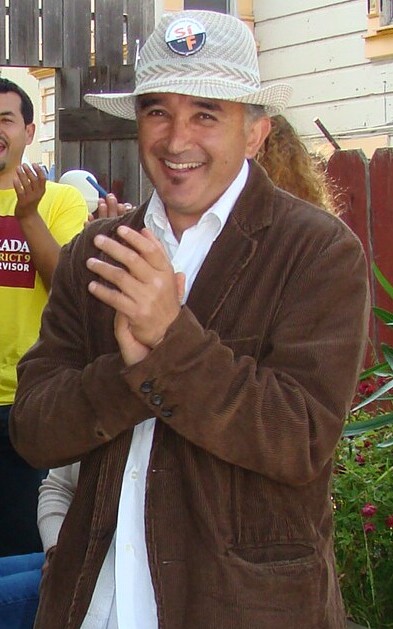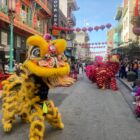When Eric Quezada — for decades a community organizer and widely respected leader on housing and economic justice and immigrants’ rights — died Wednesday after a seven-year struggle with cancer, there was an immediate outpouring of grief, love and appreciation from progressive friends and allies across San Francisco and the nation.
Quezada’s wife, immigrant rights organizer Lorena Melgarejo, shared the news of Quezada’s death on Facebook: “Eric Quezada died this morning, Aug. 24, 2011, at 5:55 a.m. with his mom, his brother and me holding him. He did it like he told me he would. Eric Quezada PRESENTE! La lucha sigue! Gracias comunidad por todo el amor y solidaridad.” (The struggle continues. Thanks to the community for all your love and solidarity.)
Within hours, hundreds of friends, family members, and city leaders flooded Facebook with words of admiration for Quezada and his courageous battles against cancer and social and economic injustice. In the early evening the day Quezada died, more than a hundred friends gathered in silence with flowers outside Eric and Lorena’s home in Bernal Heights. It was a powerful display of the deep ties built in communities throughout the city by the lonlongtime executive director of Dolores Street Community Services, who was a leading candidate for District 9 supervisor in 2008.
The evening after Quezada passed away, Ana Perez, a friend and fellow Mission District activist, wrote in a note of appreciation, “Few people have such a deep relationship with people in our community, the clarity of revolutionary politics, the energy, the unstoppable work ethic and the courage to say the truth and take on anyone who needs to be challenged in defense of community.”
Assemblyman Tom Ammiano asked his colleagues in the Legislature “to adjourn our session tomorrow in the memory of Eric Quezada — his loss is felt throughout our community, and my thoughts go out to his family and his lovely daughter. Eric’s commitment to social justice made him a hero to us all. Si se puede, Eric.”
Quezada fought valiantly not only to beat cancer — enduring multiple surgeries and wearying chemotherapy — but also to live a full and rich life despite his struggle. Even as his cancer continually resurfaced, he worked doggedly as a national leader for immigration reform (such as the DREAM Act), served as second vice chair of the San Francisco Democratic County Central Committee and on the board of directors for the Bernal Heights Neighborhood Center and other community organizations, such as PODER (People Organizing to Demand Environmental and Economic Rights).
In his decades of grassroots community work, as a leading force in the Mission Anti-Displacement Coalition, and organizer and program director at Mission Housing Development Corporation and the Mission Economic Development Agency, Quezada’s widely known hallmark was a unique blend of passionate commitment, deep integrity, and astute political and intellectual analysis.
At the height of the dot-com boom in the early 2000s, Quezada helped lead a communitywide movement against mass evictions of immigrant and working-class families who were being tossed aside by warp-speed gentrification; along with other activists, he organized hundreds of community residents to speak at city hearings and create a detailed community-driven development proposal known as the “People’s Plan” for the city’s eastern neighborhoods.
Quezada brought a blend of fiery radicalism and practical grassroots community organizing to all his work — constantly encouraging people to see the bigger picture, the international political and economic context within which local struggles occur. He built international solidarity with social justice activists in Cuba, Venezuela and other countries, traveling on solidarity and fact-finding missions and meeting with community and government leaders there.
In an October 2008 interview with Poor magazine, during his campaign for supervisor, Quezada remarked, “I come from revolutionary politics. I came into radical politics at an early age. If I win, I want my office to be a tool for the movement. Tell no lies and claim no easy victories.”
Longtime friend and political ally Victor Valdiviezo recalled Eric as “someone who constantly learned and evolved from his experiences and who struggled in honesty for the entire community. Those type of folks are very rare indeed.”
Born in Los Angeles in 1965, Quezada was the son of Guatemalan immigrants. His family moved to San Francisco in 1971 after losing their home in an earthquake in San Fernando Valley. Quezada attended Westmoor High School in Daly City, and studied international relations and Latin American studies at California State University-Chico on a soccer scholarship.
After graduating college in 1990, he settled in San Francisco and soon became immersed in Mission District community movements for affordable housing and land-use reform. For 10 years, he was an organizer and program director at Mission Housing Development Corporation, where he ran programs serving families and seniors in affordable housing, including after-school activities, employment assistance, community safety, and tenant organizing. Housing organizer Sara Shortt recalled that in Quezada’s 2008 campaign for District 9 supervisor, “Eric was a unifier because of his vigilance on ensuring that issues and causes intricately connected were not compartmentalized, and those representing them were not left to fight their battles on their own.”
Shortt, a friend and colleague of Quezada’s for years on housing justice and related issues, reflected, “Eric could take on the most extreme examples of injustice, and be able and willing to be thoughtful and strategic about responding, without compromising the heart behind it or losing sight of the values that drove the action. He was very powerful but never took that power for granted. He modeled for others the importance of recognizing the interconnectedness of issues and not getting constrained by single-issue causes or perspectives that led to competition within movements. He consistently connected the dots between homelessness, tenant’s rights, immigration, LGBT and civil rights issues and many more.”
Supervisor David Campos, once a campaign opponent of Quezada’s, grew to be a close friend and ally with Eric — whom he praised in a Facebook post as “the rare person in politics that the more you got to know him, the more you grew to love and respect him. … I always knew that I could fully trust what Eric had to say.” Campos added, “There will never be another Eric Quezada, but his legacy will live on in the hearts of those who knew him and who will continue his struggle for social justice. … You have been and will remain a hero to us all.”
In an email, Supervisor and friend Eric Mar noted that Quezada “had a unique ability to build local mass organizations, diverse alliances glued together by mutual respect/trust, and linking national and global issues to our local campaigns and community struggles. He’s at peace now (still rooting for the Giants), but we have lost an unforgettable warrior of the people.”
Laura Guzman, a longtime friend and Mission District community organizer, remembered Quezada’s “relentless spirit of protecting the most vulnerable and his big, open heart,” as an ally who “advocated with his heart for the last six years” to help launch the Dolores Hotel, a new housing project for low-income people.
Beyond his community work and politics, friends recalled his passion for music and sports. “Eric was a really well rounded person,” said Sarah Jarmon, a friend who worked heavily on Quezada’s 2008 supervisorial campaign. “He played the sax, was a great DJ, got really goofy and sang Karaoke sometimes. He had a warm smile and a wonderful laugh.”
Quezada took pride in his community roots in immigrant and working-class San Francisco.
On his 2010 Facebook page created in his successful bid for the Democratic County Central Committee, Quezada wrote: “My family has deep roots in San Francisco, starting with my great grandmother who lived in the city briefly in the 1930s. My family began emigrating from Guatemala in the ’60s and settled in San Francisco. My grandfather worked as a Muni driver retiring in the early ’90s, my father and uncle ran a bicycle shop on 24th Street in the ’70s and ’80s where I worked in the afternoons, weekends and summers.”
At a 2004 benefit for Quezada, to raise funds for his early battle with cancer, writer and housing activist James Tracy shared his poem, “We Speak of Our Comrade In Present Tense,” which included the following passage:
The humble work ofawakening people to the powerof their own hands of the strengthof their own people is done quietlyby Eric yet it is also louderthan Afro-Latin beatsblasted downValencia StreetMission StreetHarrison StreetBryant Streetand back again.Let the neighborhood knowthat today is a very good daybecause we speak of our comradein present tense.
Christopher Cook worked as communications director and volunteer for Eric Quezada’s 2008 campaign for District 9 supervisor.










